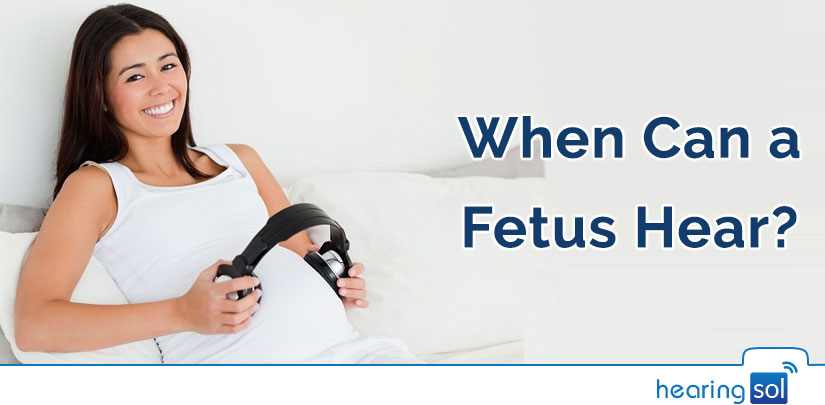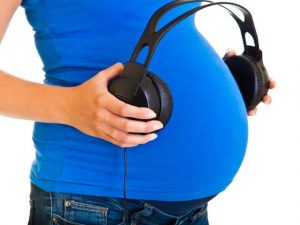
A woman, as her pregnancy proceeds, communicates with her developing fetus. Some may sing lullabies or read stories, while others listen to classical music for boosting brain development of the fetus.
You can purchase the latest hearing aids at a fair price through HearingSol, If you need any assistance or you have a query regarding Fetus Hearing, feel free to call us at +91-9327901950. We are always here to help you.
All the soon to be parents have lots of question in their mind such as-
- When can a fetus hear?
- Can babies hear in the womb at 12 weeks?
- What can cause hearing loss in newborns?
- Should I play music for developing a baby?
- How to develop better hearing in your child?
Read until the end to know everything about your baby’s developing hearing sense during pregnancy.
Time-frame For Fetal Development
| Time Frame | Fetal Development |
| 4-5 weeks | Devee, brain, nose, ears, and eyes start with the arrangement of embryo cells. |
| 9 weeks | As the baby’s ears grow, indentations appear. |
| 18 weeks | Baby is able to hear the sound |
| 24 weeks | Baby’s ear becomes more sensitive to sound |
| 25 -26 weeks | Baby is able to respond to the sound heard in the womb |
All your trials of communicating with your baby will not go in vain. During the second month of pregnancy, the formation of the baby’s eyes and ears begins.
That’s the time when embryo cells arrange themselves to become the face, brain, nose, eyes, and ears.
Some indentations can be noticed around the 9th week on the side of the baby’s neck which appears as the formation of ears on both inside and the outside. These indentations move upwards before developing into the baby’s ears.
While you are 18 weeks pregnant, your baby developing in the womb will hear their first sounds. Around 24 weeks of pregnancy, the ears develop rapidly. The baby’s ears will become more sensitive to sound with passing weeks.
The baby in the womb hears limited sound/noises which you may not even notice.
Those sounds are produced by the activities in our bodies such as heartbeat, air movement in the lungs, growling stomach, and even the sound produced by blood moving through the umbilical cord.
To know more about fetal development month by month watch the below-given video:
When Can A Fetus Hear?
As shown in the above video while the baby develops in the womb, more and more sounds will become audible to them. This helps them get used to their post-birth environment.
As your pregnancy proceeds to week 25 or 26, baby in the womb starts responding to voices and noise.
According to the recordings taken in the uterus, it is revealed that the intensity of noises from outside is reduced to half because of no open-air in the uterus.
The baby in the womb is surrounded by amniotic fluid and wrapped with the layers of your body, due to which all noises from outside are muffled.
Baby in your womb hears the mother’s voice as the most significant sound. The baby can recognize your voice while you are in your third trimester. They are more alert while you’re speaking and respond with an increased heart rate.
Loud Noises During Pregnancy
Noise levels higher than 80 dB can cause hearing loss. But loud noise as a hazard is still under study and conclusive results of the research have not emerged yet.
However, most of the sounds do not harm the fetus because of the presence of amniotic fluid inside the uterus as the sound does flow with the same frequency in a fluid as in the air.
The baby may react to the outside sounds and vibrations but as the frequency of sound in the fluid become less, it does not harm the fetus.
But still, it is not good to expose the fetus to the prolonged and repetitive noise as it can prove fatal to the fetus.
Sounds To Avoid During Pregnancy
- Avoid exposure to the sounds of the jet engine on a regular basis.
- Avoid working in a place where there is constant noise above 80 dB.
- Cease yourself from standing near a firing range.
- Avoid standing in the front row during a rock concert.
Is Music Good For A Developing Baby?

The clear sound for the baby to hear is the constant beat of a mother’s heart. Music doesn’t harm your baby. When it comes to classical music, there’s no evidence of its contribution to improving a baby’s IQ.
In fact, as your pregnancy progresses, there is no harm in continuing with the normal sounds of your daily life.
But prolonged exposure to noise may be linked to fetal hearing loss but its effects aren’t well-known. If you are spending time in a noisy environment, it is considered making changes during pregnancy to be safe.
But occasional noisy environments may not pose such a huge problem. Apart from loud noise, there are other factors that can cause hearing difficulties in newborns.
Newborn Hearing Screening
Newborn Hearing Screening Tests will be helpful in diagnosing hearing loss in children. Others may develop hearing impairment at the later stage of childhood.
According to the National Institute on Deafness and Other Communication Disorders (NIDCD), you should be familiar with what to expect from your baby as they grow.
Understanding the normal conditions and knowing the normal baby hearing development may help you determine that if you should consult a doctor or not.
What Can Cause Hearing Loss In Newborns?
According to research, every 1 to 3 out of 1000 babies are born with hearing loss. Its causes include:
- Meningitis,
- Family history,
- Premature delivery,
- Certain medications,
- Exposure to very loud sounds,
- Time in the neonatal intensive care unit,
- High bilirubin that requires a transfusion.
Talk To Your Doctor
In case you think your child has hearing difficulty then, So below are a few listed things you can discuss with your doctor –
- Was the child born early?
- What is the weight of your child at the time of birth?
- Do you have other members of the family such as brothers or sisters, who have a hearing problem?
- Does your baby often pull his/her ear?
- Did the child’s mother have any kind of medical condition at the time of delivery or pregnancy?
- Has the child at any time had meningitis?
- How often does the child have ear infections in the past year?
Here Are A Few Terms Your Doctor May Use Such As:
- Otitis media: It is a kind of middle ear infection.
- Audiogram: It is a chart that is prepared after a hearing test which shows how well you can hear.
- Otologist: a physician who diagnoses and treats diseases of the ear.
- Otolaryngologist: a doctor who treats diseases and disorders of the ear, throat, and nose.
- Speech-language pathologist: A speech therapist is a health professional specially trained to evaluate and treat individuals who have speech or language disorders.
- Audiologist: a person who tests and measures hearing, balance, and related difficulties.
- Earache: It is the pain deep in the ear.
- Pediatrician: a physician who takes care of infants and children’s health.
Baby Activities Timeline
For determining baby hearing development you may use the hearing and communicative development checklist below as your initial guide.
From The Time Of Birth Until 3 Months Of Age, The Baby Should:
- Recognize your voice
- Calm reactions when you speak to them
- Have many types of crying to signal different needs
- React to loud noise, including while breastfeeding or bottle-feeding.
From 4 To 6 Months Of Age, The Baby Should:
- Laugh
- Notice music.
- Track you with their eyes.
- Notice toys that make noise.
- Respond to changes in your tone.
- Make babbling and gurgling sounds.
From 7 Months To 1 Year Of Age, The Baby Should:
- Babble to get attention.
- Turn in the direction of sounds.
- Listen when you’re speaking to them.
- Babble with noticeable groups of sounds.
- Play games like peek-a-boo and pat-a-cake.
- Communicate by waving or holding up their arms.
- Understand a few words (“Papa,” “mama,” “shoes”).
How To Develop Better Hearing In Your Child?
- Get her toys that come with sounds and songs.
- When your baby is old enough, introduce her with a musical instrument.
- Sing along with her the nursery rhymes and lullabies on a daily basis.
- Play music on your phone and dance along with her and clap hands.
Expert Insight
According to an old wives’ tale, making your unborn baby listen to classical music will help them become smarter. This effect is referred to as “Mozart Effect,” but there is no scientific evidence to support this effect.
But still, it is no harm to their ears. Rather it will make them a fan if you continue their exposure to classical music after their birth.
Warning
To check the progress of fetal development, ultrasounds are considered. But ultrasound creates a loud noise inside the uterus, according to an article published in NewScientist.
The act is that Ultrasound is as loud as the arrival of a train at the station. This is the reason why some experts suggest that ultrasound transducers shouldn’t be aimed towards the ears of a developing fetus in the womb.
Conclusion
It takes us to the conclusion that babies will learn and develop abilities at their own pace. But you may need to consult a doctor if you notice that your baby isn’t meeting the milestones mentioned here in the appropriate time frame.
You can purchase the latest hearing aids at a fair price through HearingSol, If you need any assistance or you have a query regarding Fetus Hearing, feel free to call us at +91-9327901950. We are always here to help you.

 Reviewed by Mr. Ranjeet Kumar
Sr. Audiologist, Speech Therapist & Cochlear Implant Specialist, BASLP on
Reviewed by Mr. Ranjeet Kumar
Sr. Audiologist, Speech Therapist & Cochlear Implant Specialist, BASLP on